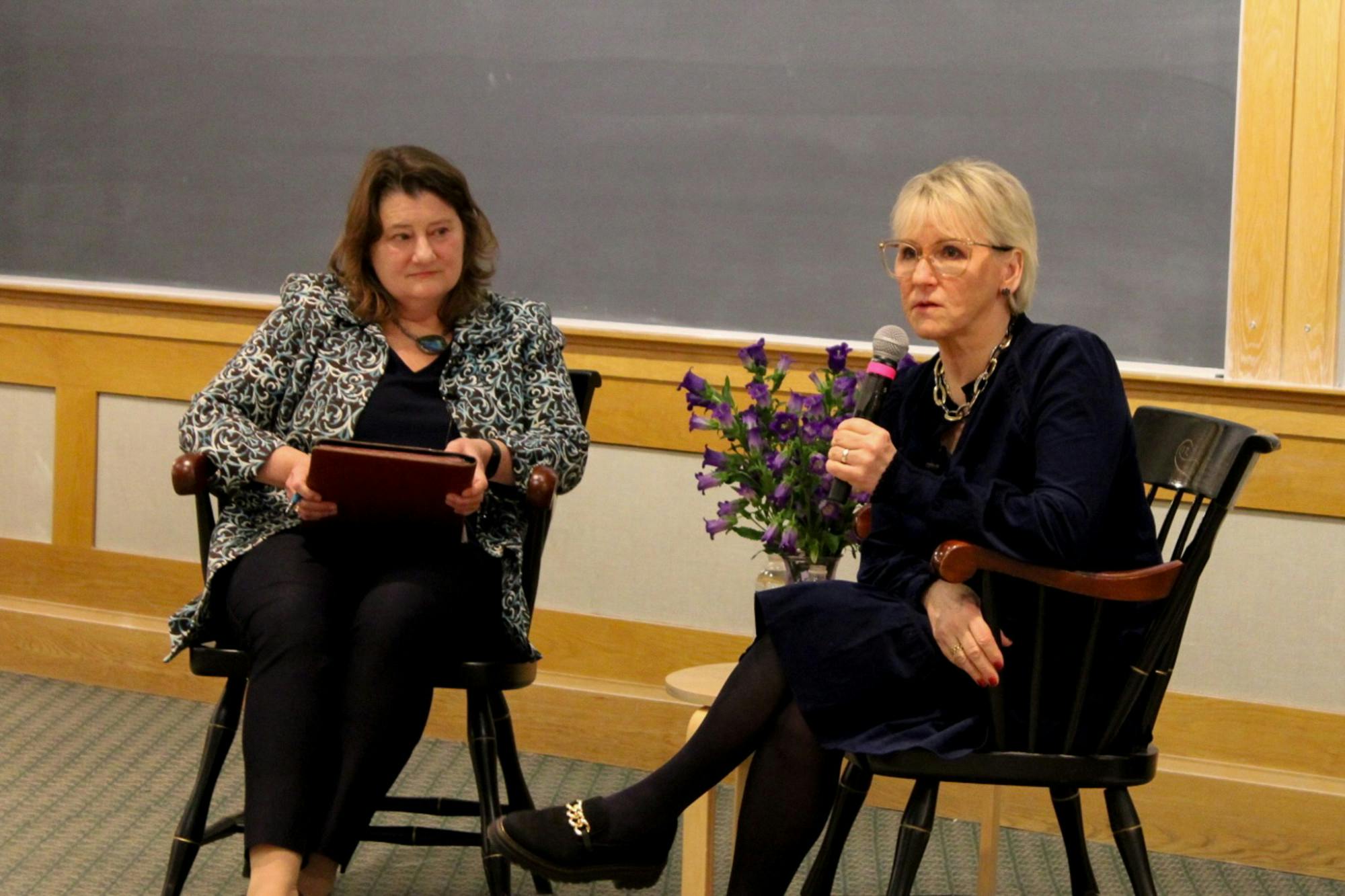On April 11, the Dickey Center for International Understanding hosted a conversation titled “More Than Lip Service” with former Swedish foreign affairs minister Margot Wallström. Dickey Center director Victoria Holt moderated the discussion, which was part of the Obenshain Family Great Issues Lectures series — a series featuring distinguished scholars and practitioners from the world of international affairs.
Approximately 50 people attended the event in person, while 20 joined via a livestream, according to Dawn Carey, associate director of Global Health and Development at the Dickey Center.
Wallström began her remarks by discussing her journey to becoming a high-ranking Swedish politician, explaining that she never thought she would enter the world of politics.
“I come from a working-class family in the north of Sweden with no background or context of political engagement or trade unionists, or anything of that sort,” she said.
Wallström said her work in politics began locally, after a neighbor asked her to start a youth club at age 17. She said she founded the club when “times were political,” pointing to the Vietnam War and strife in Chile.
“We followed everything that went on in the international scene, and we were very engaged,” Wallström said. “That really raised our interest in politics. It was foreign policy that did so.”
Wallström then discussed her role as the United Nations special representative on sexual violence in conflict — a position that was “very much about fighting impunity” for sexual crimes in war.
“It was a matter of traveling towards these hotspots and war-torn countries or post-conflict countries to listen to survivors,” she said. “It left me with a heavier heart but also with more hope for the future because all of these survivors insisted not to be treated as a victim.”
Wallström described sexual violence in wars as “a crime that can be commanded, condoned or condemned,” adding that society holds three common misconceptions about sexual violence in conflict.
“The first is that it is inevitable, that this has been part of every war and conflict since time eternal,” she said. “And then, that it is unspeakable because it has something to do with sex. It has something to do with power, with a sexual expression.”
Wallström said the third misconception is that sexual violence in wars is a lesser crime than other aspects of war, such as killing.
“This has been used as a defense, where one of the commanders in Bosnia Herzegovina said, ‘But I could have killed her,’” Wallström said. “He thought it was a lesser crime to rape this person, who would then carry that stigma for the rest of her life.”
Wallström then shifted to discuss her role as Sweden’s foreign affairs minister. She described Sweden as a “loyal member of both the United Nations and the European Union,” with basic foreign policy objectives to offer “generous foreign aid” and “advocat[e] for free trade.”
She said, however, that “feminist foreign policy” — a policy area she witnessed firsthand in the UN — was “missing” from the country’s foreign policy objectives. After introducing a plan to empower women in foreign policy, Wallström said she experienced some pushback from older ambassadors.
“I immediately knew I had to give them parameters for how to interpret [the feminist foreign policy],” she said.
Wallström defined feminism as men and women enjoying the same rights, obligations and opportunities. Within the context of foreign policy, Wallstrom said it is necessary to look at the “rights, representation and resources” offered to women.
“Do women enjoy the same rights?” she asked. “Do they have the right to go to school? To have a job? To open a bank account? To start a business? To not get married away when they are children?”
She added that feminist foreign policy is a practical goal, explaining that society cannot reach “sustainable peace” if women are not included in negotiations or peace processes.
An audience member asked Wallström whether Sweden’s recent decision to join NATO in March would put gender-based violence issues at the forefront of the organization’s policies.
“[NATO] has some really good representatives working on these matters,” she said. “I think that the member states have to insist on giving it a more prominent role … I doubt that might happen.”
Ellison Weiner ’27 said she attended the event at the recommendation of international affairs fellow Elizabeth Shackelford, who is teaching Weiner in INTS 15: “Violence and Security” — a course on feminization in international relations. Weiner said the “optimism” that guided Wallström to foreign policy stood out to her, as Wallström believed she “could really make a difference in the world.”
Eva Bianco ’24 said she attended the event because she has been interested in feminist foreign policy “for years.” She added that she wrote a paper last year on Sweden’s feminist foreign policy and discussed Wallström in her essay.
“I think a part of the discussion that is really valuable is how [Wallström] used this label ‘feminist’ as a way to open conversation, instead of close it,” Bianco said.
In addition to her role as foreign affairs minister, Wallström served as the deputy prime minister of Sweden from 2014 to 2019. She also served as the European commissioner for the environment from 1999 to 2004 and as the vice president of the European Commission from 2004 to 2010. Wallström was also appointed to be the first United Nations special representative on sexual violence in conflict in 2010, holding the position until 2012.
Vidushi Sharma ’27 is a managing editor and news reporter. She is majoring in Government and minoring in International Studies and Sociology. On campus, Vidushi is a Dickey Center War and Peace Fellow, an educational access advisor for the Dartmouth Center for Social Impact and an associate editor for the Dartmouth Law Journal.


